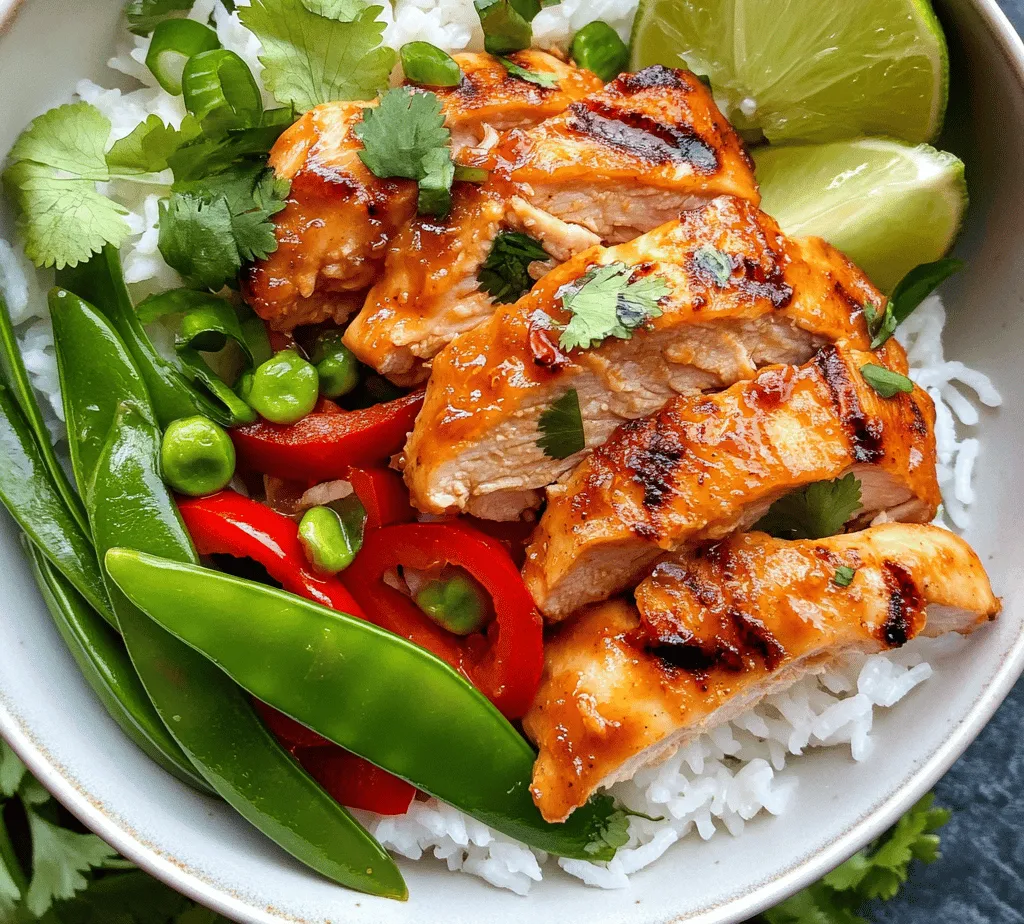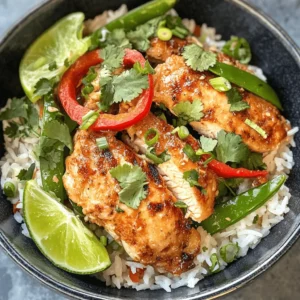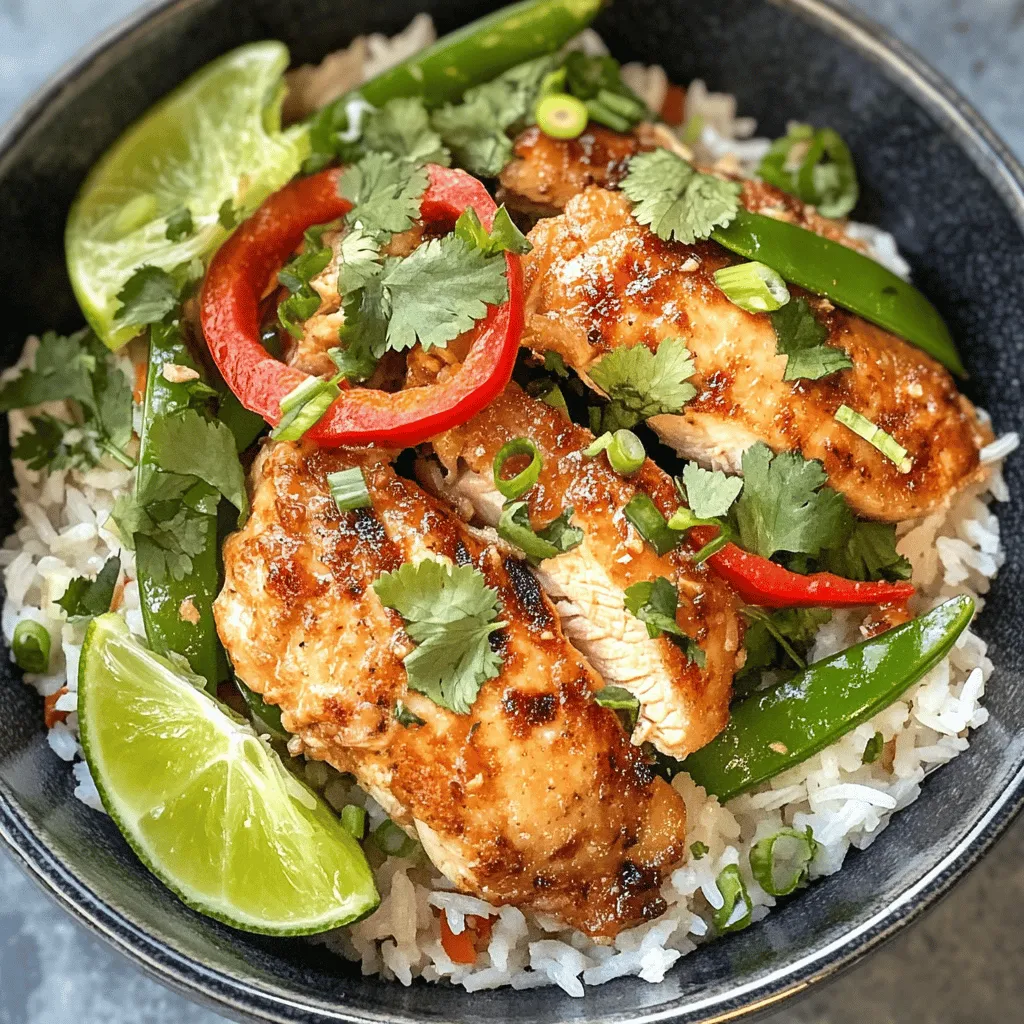Introduction
The Coconut Chicken Rice Bowl is a delightful dish that captivates the palate with its unique blend of flavors and textures. This vibrant bowl is a feast for the senses, marrying tender chicken thighs, aromatic jasmine rice, and fresh vegetables, all enveloped in a luxurious coconut milk sauce. Its roots are deeply entrenched in Southeast Asian cuisines, where coconut and rice are staples, reflecting not only the regional abundance of these ingredients but also the culinary traditions that celebrate their harmony.
As globalization introduces us to various culinary influences, the Coconut Chicken Rice Bowl has found its way into homes around the world, becoming a popular choice for those seeking a balance of comfort and nutrition. This dish is not only delicious; it embodies the essence of easy cooking that fits perfectly into our busy lifestyles. With its straightforward preparation and quick cooking time, it’s an ideal solution for weekday dinners or weekend meal prep.
Health Benefits of the Ingredients
In addition to its mouthwatering flavors, the Coconut Chicken Rice Bowl is packed with health benefits. The primary components—coconut milk and chicken—bring a wealth of nutrients to the table.
Coconut milk, derived from the flesh of mature coconuts, is rich in medium-chain triglycerides (MCTs), which are known to provide quick energy and may support weight management. It’s also a good source of vitamins C, E, B vitamins, and minerals like magnesium and potassium, contributing to overall health. The creaminess of coconut milk not only enhances the texture of the dish but also elevates the flavor profile, making it a key ingredient in the recipe.
Chicken, particularly boneless, skinless thighs, adds a hearty protein element that is essential for muscle repair and growth. Chicken thighs are juicier and more flavorful than breast meat, making them an excellent choice for this dish. They also provide essential nutrients such as B vitamins, iron, and zinc, which are vital for energy production and immune function.
Moreover, the inclusion of colorful vegetables like red bell peppers and snow peas not only adds visual appeal but also boosts the dish’s nutritional value. These vegetables are rich in vitamins A and C, antioxidants, and dietary fiber, contributing to a well-rounded meal that satisfies both hunger and health goals.
Understanding the Key Ingredients
To create a Coconut Chicken Rice Bowl that truly stands out, it’s essential to understand the key ingredients that contribute to its flavor, texture, and nutrition.
Jasmine Rice
Jasmine rice is the preferred choice for this dish due to its fragrant aroma and slightly sticky texture when cooked. Originating from Thailand, this long-grain rice is known for its delicate floral notes, which complement the rich flavors of coconut milk. Nutritionally, jasmine rice is a good source of carbohydrates, providing the necessary energy for an active lifestyle. It also contains small amounts of protein and is gluten-free, making it suitable for various dietary preferences.
To achieve the perfect texture, rinsing the jasmine rice before cooking is crucial. This process removes excess starch, preventing the rice from becoming overly sticky and clumpy. The end result is fluffy grains that serve as a delightful base for the other components of the bowl.
Coconut Milk
The star ingredient, coconut milk, is what elevates this dish to new heights. Not only does it provide a creamy texture, but it also infuses the rice and chicken with a rich flavor that is both comforting and exotic. The health benefits of coconut milk are numerous; it contains healthy fats that can aid in digestion and provide a feeling of fullness, which is important for those watching their caloric intake.
In this recipe, coconut milk is used to create a sauce that coats the chicken and rice, ensuring every bite is flavorful. When selecting coconut milk, look for brands that use minimal additives to ensure the purest taste.
Chicken Thighs
Boneless, skinless chicken thighs are ideal for this Coconut Chicken Rice Bowl due to their rich flavor and tender texture. Thighs have a higher fat content than chicken breast, which keeps them juicy during cooking and enhances the overall dish. Moreover, marinating the chicken in a mixture of coconut milk and seasonings not only infuses it with flavor but also helps tenderize the meat, resulting in a succulent bite.
When preparing the chicken, it’s essential to cut it into uniform pieces to ensure even cooking. This attention to detail will enhance the presentation of your rice bowl and create a more enjoyable eating experience.
Vegetables
Fresh vegetables play a crucial role in the Coconut Chicken Rice Bowl, adding both flavor and nutrition. Red bell peppers are a standout choice due to their sweetness and vibrant color. They are packed with vitamin C, which supports the immune system and skin health. Additionally, their crisp texture provides a satisfying crunch that contrasts beautifully with the soft rice and tender chicken.
Snow peas are another excellent addition, known for their delicate sweetness and bright green color. They are low in calories and high in nutrients, including vitamins A, C, and K, as well as dietary fiber. Their quick cooking time makes them perfect for sautéing, allowing them to retain their crispness while adding a pop of color to the dish.
Fish Sauce and Soy Sauce
To enhance the umami flavors of the Coconut Chicken Rice Bowl, fish sauce and soy sauce are often incorporated into the dish. Fish sauce, a staple in Southeast Asian cooking, adds depth and complexity to the flavors, while soy sauce contributes a savory richness. Together, they create a balanced flavor profile that elevates the dish beyond ordinary chicken and rice.
When using these sauces, it’s essential to start with a small amount and adjust to taste, as they can be quite salty. This attentiveness to flavor will ensure that your Coconut Chicken Rice Bowl is well-seasoned and delicious.
Step-by-Step Guide to Preparing Coconut Chicken Rice Bowl
Creating the perfect Coconut Chicken Rice Bowl is a straightforward process, but it requires attention to detail and careful preparation. Below is a comprehensive guide to making this dish, focusing on each component to ensure a delicious outcome.
Cooking Jasmine Rice
1. Rinse the Rice: Begin by measuring out your jasmine rice. Rinse it under cold water in a fine-mesh strainer until the water runs clear. This step is crucial for removing excess starch, which can make the rice gummy.
2. Cooking the Rice: In a medium saucepan, combine the rinsed rice with water in a ratio of 1 cup of rice to 1.5 cups of water. Add a pinch of salt for flavor. Bring the mixture to a boil over medium-high heat.
3. Simmer the Rice: Once boiling, reduce the heat to low, cover the saucepan, and let it simmer for about 15 minutes, or until the water is absorbed and the rice is tender. After cooking, remove the saucepan from heat and let it sit, covered, for an additional 5 minutes. This resting period allows the rice to steam and become fluffy.
4. Fluffing the Rice: After resting, use a fork to fluff the rice gently. This will separate the grains and enhance its texture, making it the perfect bed for your chicken and vegetables.
Marinating Chicken
1. Prepare the Marinade: In a bowl, combine coconut milk, minced garlic, a splash of fish sauce, and a dash of soy sauce. Stir well to mix the ingredients.
2. Marinate the Chicken: Cut the boneless, skinless chicken thighs into bite-sized pieces and add them to the marinade. Ensure the chicken is well-coated and let it marinate for at least 30 minutes, or up to 2 hours in the refrigerator. This marination process allows the chicken to absorb the flavors and remain tender during cooking.
Cooking Methods
While sautéing is the preferred method for this recipe, it’s essential to understand the different cooking techniques that can be utilized for the chicken.
– Sautéing: Heat a large skillet or wok over medium-high heat and add a tablespoon of oil. Once hot, add the marinated chicken pieces in a single layer. Allow them to cook undisturbed for a few minutes to develop a nice sear before stirring. Sauté until the chicken is cooked through and lightly browned, about 6-8 minutes.
– Grilling: An alternative cooking method would be grilling the marinated chicken. Preheat the grill and cook the chicken pieces for about 5-7 minutes per side, or until fully cooked. Grilling adds a smoky flavor that can enhance the overall dish.
– Baking: If you prefer a hands-off approach, you can also bake the marinated chicken in the oven. Preheat the oven to 375°F (190°C) and place the chicken on a baking sheet lined with parchment paper. Bake for about 20-25 minutes or until the chicken is cooked through.
Sautéing Vegetables
1. Prepare the Vegetables: While the chicken is cooking, slice the red bell pepper into thin strips and trim the ends of the snow peas.
2. Sautéing: In the same skillet used for the chicken, add a little more oil if necessary. Add the sliced red bell pepper and snow peas. Sauté for 3-4 minutes over medium heat until the vegetables are tender-crisp and vibrant in color. This method ensures that the vegetables maintain their freshness and nutritional value.
3. Combining Ingredients: Once the chicken is cooked and the vegetables are sautéed, combine them in the skillet, allowing the flavors to meld for another minute or two. This final step ensures that every component of the Coconut Chicken Rice Bowl is perfectly integrated.
Visual Aids and Photos
To enhance understanding and engagement, it is beneficial to incorporate visual aids throughout the cooking process. Hypothetical images could showcase the key steps, from rinsing the rice to sautéing the chicken and vegetables. This not only helps readers visualize the process but also encourages confidence in their cooking skills.
—
With this foundational understanding of the Coconut Chicken Rice Bowl, its ingredients, and the initial steps of preparation, you are well on your way to creating a delightful meal. This dish not only satisfies hunger but also nourishes the body, making it a wonderful addition to your culinary repertoire. Stay tuned for the next part, where we will explore flavor enhancements and variations to elevate this dish even further!

Suggestions for Customizing the Coconut Chicken Rice Bowl
The beauty of the Coconut Chicken Rice Bowl lies in its versatility. There are countless ways to customize this dish to suit your personal taste preferences or dietary needs. Here are some ideas to inspire your culinary creativity:
1. Vegetarian or Vegan Alternatives: If you’re looking for a vegetarian or vegan option, consider replacing the chicken with tofu or a medley of vegetables. Firm tofu can be marinated in a mixture of coconut milk, soy sauce, and spices before being sautéed until golden and crispy. Alternatively, you can use seasonal vegetables such as bell peppers, zucchini, and broccoli. These can be stir-fried in the coconut sauce for a delicious and nutritious bowl.
2. Spice Level Adjustments: For those who enjoy a bit of heat, incorporate chili or hot sauce into the recipe. You can add fresh chopped chilies or a sprinkle of red pepper flakes to the coconut sauce for an extra kick. Hot sauce can also be drizzled over the finished bowl, allowing each person to tailor the spice level to their liking.
3. Additional Toppings: Elevate your Coconut Chicken Rice Bowl with various toppings. Nuts like toasted cashews or peanuts add a delightful crunch and a nutty flavor. Seeds such as sesame or sunflower seeds can also be sprinkled on top for added texture and nutrition. Fresh herbs like cilantro, basil, or mint can enhance the dish’s aromatic profile, making each bite more flavorful.
4. Cultural Variations: The Coconut Chicken Rice Bowl draws inspiration from several culinary traditions. In Southeast Asian countries, such as Thailand and Malaysia, coconut rice is a staple dish often served with grilled meats and vegetables. In Caribbean cuisine, similar bowls are created using coconut milk and spices, featuring local ingredients like plantains. Exploring these cultural variations can add another layer of excitement to your cooking experience.
The Nutritional Profile of Coconut Chicken Rice Bowl
Understanding the nutritional profile of the Coconut Chicken Rice Bowl can help you appreciate its benefits as part of a balanced diet. Here’s a breakdown of what you can expect in a typical serving:
– Calories: A serving of Coconut Chicken Rice Bowl contains approximately 500-600 calories, depending on the specific ingredients and portion sizes used. This makes it a satisfying main dish without being overly heavy.
– Macronutrients: The dish is rich in protein (thanks to the chicken or plant-based alternatives), healthy fats (from coconut milk), and carbohydrates (from rice). A typical serving contains around 30 grams of protein, 20 grams of fat, and 50-60 grams of carbohydrates, making it a well-rounded meal.
– Vitamins and Minerals: The ingredients in this recipe contribute essential vitamins and minerals. Chicken is a great source of B vitamins, including niacin and B6, which support energy metabolism. Coconut milk provides healthy fats and manganese, vital for bone health. Additionally, vegetables add fiber, vitamins A and C, and antioxidants.
For those looking to make healthier choices, consider using low-sodium alternatives for broth and sauces. This can help reduce sodium intake while still preserving flavor.
Serving Suggestions and Pairings
To enhance your Coconut Chicken Rice Bowl experience, consider these serving suggestions and pairings:
1. Side Dishes: Complement your bowl with fresh sides that balance the richness of the coconut milk. A simple cucumber salad with lime dressing or a side of steamed edamame can provide a refreshing contrast. Alternatively, a light Asian slaw made with shredded cabbage, carrots, and a sesame dressing would add crunch and flavor.
2. Beverage Pairings: When it comes to drinks, coconut water is an excellent choice, as it echoes the dish’s coconut flavor. For something more robust, a chilled glass of white wine, like Sauvignon Blanc or a light Pinot Grigio, can enhance the dish’s tropical notes. For non-alcoholic options, consider serving iced green tea or a coconut-infused lemonade.
3. Presentation Tips: The visual appeal of your Coconut Chicken Rice Bowl can significantly enhance the dining experience. Serve the dish in a deep bowl to showcase the colorful ingredients. Consider layering the rice at the bottom, followed by the chicken or tofu, and then topping with vibrant vegetables and herbs. A drizzle of the coconut sauce over the top can add a glossy finish, making it inviting and appetizing.
Storing and Reheating Leftovers
If you find yourself with leftovers after enjoying your Coconut Chicken Rice Bowl, proper storage and reheating techniques are essential to maintain freshness and flavor:
1. Proper Storage Techniques: Store leftover Coconut Chicken Rice Bowl in an airtight container in the refrigerator. It’s best to separate the rice from the chicken and vegetables to prevent the rice from becoming soggy. The dish can typically be stored in the fridge for up to 3-4 days.
2. Reheating Instructions: When it’s time to enjoy your leftovers, reheat the rice and chicken separately to preserve texture. For the rice, add a splash of water and microwave in 30-second intervals, stirring in between until heated through. For the chicken and vegetables, reheat in a skillet over medium heat, adding a bit of coconut milk or broth to keep them moist.
3. Shelf Life Considerations: Each ingredient has a different shelf life. Cooked chicken can last in the fridge for about 3-4 days, while cooked rice can generally be kept for up to a week. Coconut milk, once opened, should be used within 5-7 days. Always check for signs of spoilage, such as off odors or discoloration, before consuming leftovers.
Conclusion
The Coconut Chicken Rice Bowl is not only a delicious and satisfying meal but also a canvas for culinary creativity. Its adaptability allows everyone to find their perfect version, whether through the choice of protein, spice levels, or additional toppings. By understanding its nutritional profile and exploring serving suggestions, you can enjoy this dish as a wholesome and balanced part of your diet.
We encourage you to experiment with the recipe and make it your own, incorporating your favorite flavors and ingredients. Cooking is a joyful experience, one that brings people together and fosters connections. So gather your family and friends, share a meal, and relish the flavors of this delightful Coconut Chicken Rice Bowl. Happy cooking!



